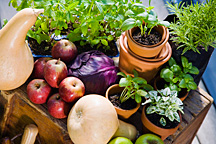To Your Health
May, 2009 (Vol. 03, Issue 05) |
|
|
Go ORGANIC!
Grow Your Own Garden of Good Food
By David Barnes, PhD
Let's face facts: As a nation, most of the food we eat is of poor nutritional quality. We have come to value the quantity of our food supply more than its quality. More than that, for the sake of convenience and cost, we limit our consumption of whole foods such as fresh fruits and vegetables and instead turn to refined, processed, pre-packaged, and pre-made foods. You can imagine that in the course of these foods being made, valuable nutrients are left behind.
Whole foods, as the name suggests, have a whole lot more to offer than processed, refined foods, and the healthiest whole foods of them all are organic foods. Today, finding organic and less refined foods is becoming easier and less expensive, making it a viable option when pursuing our universal goal to maintain health.
Creating an Environment Ripe for Good Health
Organic foods are grown or raised (meat and dairy) in an environment free from anything artificial including chemical fertilizers, pesticides, weed killers, drugs, antibiotics and hormones. Organic food is produced in a manner that helps retain powerful nutritive value and avoids unnecessary exposure to potential toxins - a double-whammy of health benefits.
 Conventional (nonorganic) food production takes advantage of artificial aids to produce very high quantities of uniform product. In this inorganic system, less care is taken to maintain soil health, which means plants have fewer resources to draw upon during growth. Scientists have studied whether this means there are nutritional differences between organic and conventional foods (primarily plants); the results are unclear. However, what we do know is that there is less risk of exposure to the chemicals used in conventional food production when you eat organic.
Conventional (nonorganic) food production takes advantage of artificial aids to produce very high quantities of uniform product. In this inorganic system, less care is taken to maintain soil health, which means plants have fewer resources to draw upon during growth. Scientists have studied whether this means there are nutritional differences between organic and conventional foods (primarily plants); the results are unclear. However, what we do know is that there is less risk of exposure to the chemicals used in conventional food production when you eat organic.
One of the easiest ways to purchase organic food is locally from farmer's markets, family farms and food co-ops, many of which use organic production methods. If you like the idea of consuming an apple grown down the street, picked at the peak of its ripeness without post-harvest pesticides, and that didn't travel thousands of miles from another country (which may or may not have appropriate pesticide regulations), then a farmer's market, farm or co-op is an excellent resource.

